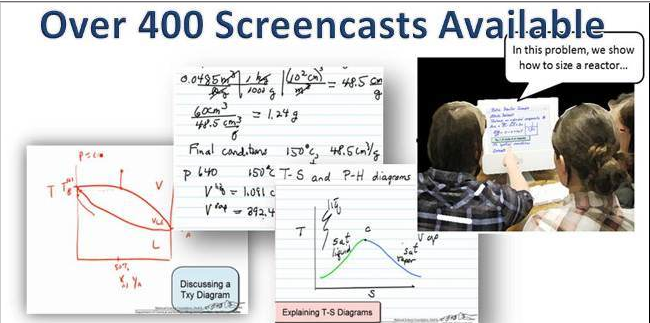
The chemical engineering faculty and staff at the University of Colorado (CU) at Boulder developed Screencasts to give students an effective alternative to simply hitting the books or reviewing classroom notes. Screencasts are short videos (10 minutes or less) of narrations with screen recordings (typically notes handwritten on a tablet).
According to the Screencast website, more than 95% of ChemE students find screencasts useful, and students who have used screencasts for their courses scored higher than students using traditional textbooks and notes.
A variety of faculty and staff at CU-Boulder, including John Falconer, Will Medlin, Janet deGrazia, and Garret Nicodemus, have help made the program possible using funding from by the National Science Foundation. Begun in 2009, the webpage (www.learncheme.com) went live August 2010 and has already more than 400 screencasts in seven courses in chemical engineering, including thermodynamics, kinetics/reactor design, mass/energy balances, fluids, heat transfer, separations, and engineering calculations. Additionally, an FE review is also available. Screencasts have been watched over 37,000 times, and downloaded over 38,000 times from iTunesU. To date, there is no other webpage that provides open access to this type of chemical engineering content.
How they work
Screencasts' appeal to different learning styles and address specific topics, concepts or problems. They contain detailed solutions to example problems, mini-lectures, explanations of concepts, and tutorials on software use. Screencasts were developed to be a supplement to textbooks, classes, and office hours, and they can be used to provide an alternate explanation from the book, review for exams, and to refresh materials covered in pre-requisite courses.
"It is somewhat similar to having a narrated textbook and instructor explanations whenever you want," commented Garret Nicodemus. The tool is designed with the new generations of tech savvy ChemE students in mind. Additionally it is a way of providing a long-lasting tool for professors to use as an aid such that they can have more time inside the classroom for personalized interaction with the students. It is important to mention this is not targeted as a substitute for student/professor interaction, but rather to allow a professor to integrate more hands-on activities during lecture time. Screencasts are designed to aid both ChemE professors and students in making teaching more effective. This project goes along with recent efforts from CU ChemE professors based on Nobel laureate Prof. Carl Weiman's research on effective science and engineering teaching methods.
Additionally, over 1,000 ConcepTests are available for authorized instructors. These consist of multiple-choice questions that reinforce the concepts covered in the screencasts. When used with classroom response systems (i.e., clickers), these promote active learning through peer discussion and instant feedback.
To check out and download the screencasts or to learn more, go to:
Website: www.learncheme.com
Vimeo: http://vimeo.com/learncheme
Twitter: https://twitter.com/#!/learncheme
iTunesU: http://itunes.apple.com/us/institution/university-colorado-boulder/id381163745
E-mail: learncheme@colorado.edu



